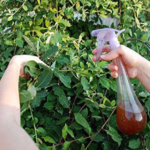Organic Pesticides
- greenwhisper_admin
- February 18, 2023
- Blog

Organic pesticides are made from natural sources and are used to control pests and diseases in gardening. Here are some examples of organic pesticides that can be used in gardening:

Neem oil: Neem oil is a natural oil extracted from the seeds of the neem tree. It can be used to control a variety of pests, including aphids, mites, and whiteflies.
Pyrethrin: Pyrethrin is a natural insecticide that is derived from the chrysanthemum flower. It can be used to control a variety of insects, including mosquitoes, flies, and fleas.
Bacillus thuringiensis (Bt): Bt is a naturally occurring bacteria that can be used to control pests such as caterpillars and mosquitoes.
Diatomaceous earth: Diatomaceous earth is a fine powder made from the fossilized remains of diatoms. It can be used to control pests such as ants, fleas, and roaches.
Garlic spray: Garlic spray is a natural pesticide that can be made by steeping garlic cloves in water. It can be used to control a variety of pests, including aphids, spider mites, and whiteflies.
Soap spray: Soap spray is made by mixing liquid soap with water. It can be used to control pests such as aphids, spider mites, and mealybugs.
Organic pesticides can be a safer and more eco-friendly alternative to synthetic pesticides. However, it is important to note that even organic pesticides can have negative effects on beneficial insects, such as bees and ladybugs, so it is important to use them sparingly and as a last resort. It is always best to use preventive measures, such as crop rotation and companion planting, to minimize the need for pesticides.

why we use pesticides
Pesticides are used to control pests, which are organisms that can cause damage to crops, gardens, homes, and other structures. Pests include insects, rodents, weeds, fungi, and bacteria. Pesticides are designed to kill, repel, or otherwise control these pests and prevent or reduce the damage they cause.
Here are some reasons why pesticides are used:
To protect crops: Pesticides are used to protect crops from pests and diseases that can reduce yields or destroy entire crops. Without pesticides, farmers would have a much harder time growing enough food to feed the world’s population.
To prevent the spread of disease: Pesticides are used to control pests that can spread diseases to humans and animals. For example, mosquito control is important for preventing the spread of diseases such as malaria, dengue fever, and Zika virus.
To control pests in homes and public areas: Pesticides are used to control pests in homes, schools, and other public areas such as parks and playgrounds. This helps to prevent infestations and reduce the risk of disease transmission.
To maintain aesthetic value: Pesticides are used in gardening and landscaping to maintain the aesthetic value of gardens, lawns, and other green spaces. This can include controlling pests such as weeds and insects that can damage the appearance of these areas.
While pesticides can be effective in controlling pests, they can also have negative effects on the environment, human health, and non-target organisms. Therefore, it is important to use pesticides responsibly and to explore alternative methods of pest control whenever possible.






